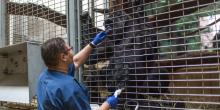#GorillaStory: What to Expect


As western lowland gorilla Calaya nears the end of her pregnancy, keepers at the Great Ape House are keeping a close watch on her, monitoring for any indication that she is in labor. Calaya is due to give birth anytime between now and early May.
“The initial signs of labor can be subtle,” says primate keeper Melba Brown. “It could be as simple as her not eating all of her daily diet, or it could be that she spends less time than usual with other members of her troop. Because this is her first pregnancy, and every gorilla’s persona is different, it is difficult to predict how labor and delivery will unfold. It could be brief, or it could take hours. Our plan is to keep the gorillas’ routine as close to the norm as possible. We trust that the gorillas have an innate ability to handle a birth. However, our team is ready and prepared to intervene in the event she has difficulty delivering or caring for her infant.”
Daily interactions and husbandry training sessions play an important role in the animal care team’s ability to assess each gorilla’s health and well-being. In addition to these face-to-face interactions, keepers use closed-circuit cameras to monitor the gorillas’ behavior remotely in the keeper office.
The primate team anticipated that Calaya’s pregnancy would shift the gorillas’ behaviors and dynamics, and it has. Calaya lives in a troop with 25-year-old silverback Baraka, 35-year-old female Mandara and 9-year-old Kibibi. While Calaya typically assumes the role of dominant female in the group, she has been more relaxed and passive in her third trimester.
Lately, Calaya has taken to resting throughout the day. To keep her comfortable, keepers provided Calaya with extra fleece blankets to make her nests even cozier. In an earlier #GorillaStory update, Brown discussed the purpose of nest building.
“Since Calaya has been pregnant, Kibibi has ratcheted up her play behaviors and displays, beating her chest and periodically tossing items at Calaya. Just this week, Kibibi initiated play by jumping up, beating her chest and running away. In response, Calaya stomped her feet, beat her chest and ran after Kibibi.”
Father-to-be Baraka’s behavior has also changed in response to Calaya’s pregnancy. He has a reputation as both a protective and gentle peace-keeper within the troop.
“Before Calaya’s pregnancy, Baraka would assert his dominance if Calaya squabbled with the other females,” Brown explains. “Now, he is much gentler with her when he needs to settle an antagonistic encounter between the females in the troop.”
The troop remains a cohesive group, and playful sessions like those mentioned above are a good sign that relationships within the troop remain strong.
“It’s the perfect environment for a successful birth,” Brown says.

